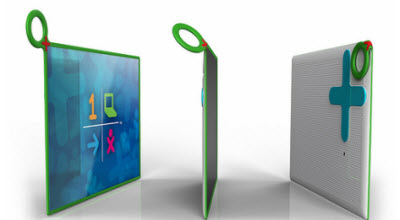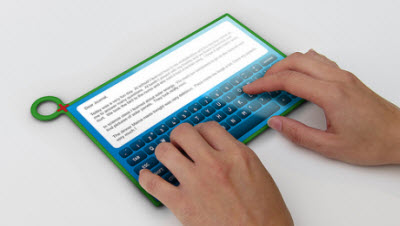One Laptop per Child and Marvell have joined forces to create a tablet computer that delivers a a better educational experience for schoolchildren in developing countries. This partnership may go a long way toward the nonprofit’s group of getting $100 computers in the hands of every child.
 OLPC, a Cambridge, Mass.-based nonprofit started by former MIT MediaLab director Nicholas Negroponte, has a mission of providing a laptop to every child in the world. It has delivered 1.5 million laptops, but it has had a hard time fulfilling its mission in part because of the relatively high cost of components. The alliance is a significant one because it can bring OLPC’s vision closer to fruition, and because OLPC itself has had a profound influence on designs by the rest of the computer industry, which now cares about making lower-power, lower-cost devices for consumers.
OLPC, a Cambridge, Mass.-based nonprofit started by former MIT MediaLab director Nicholas Negroponte, has a mission of providing a laptop to every child in the world. It has delivered 1.5 million laptops, but it has had a hard time fulfilling its mission in part because of the relatively high cost of components. The alliance is a significant one because it can bring OLPC’s vision closer to fruition, and because OLPC itself has had a profound influence on designs by the rest of the computer industry, which now cares about making lower-power, lower-cost devices for consumers.
That’s where Marvell’s new Moby educational tablet platform comes in. Marvell has created ARM-based chips that serve as the brains of a low-power tablet computer, and it has also come up with a design prototype for the entire tablet. Ed McNierney, chief technology officer of the OLPC Foundation, said in an interview that using Marvell’s design could accelerate the deployment of the X0 3.0 design (pictured) by two years. That’s because Marvell’s reference design (a full tablet computer blueprint) means that OLPC won’t have to do nearly as much custom engineering. Also, Marvell’s engineers will do much of the design work themselves.
 Marvell will also bring the costs down because it plans a big push into education computers as part of its vision to expand computing, said Weili Dai, co-founder and vice president and general manager of the consumer and computing business at Santa Clara, Calif.-based Marvell. Since the Moby platform could be used by many different customers, Marvell will be able to achieve cost efficiencies more easily and bring OLPC — whose current laptops cost $170 — within striking distance of its long-held goal of making $100 computers.
Marvell will also bring the costs down because it plans a big push into education computers as part of its vision to expand computing, said Weili Dai, co-founder and vice president and general manager of the consumer and computing business at Santa Clara, Calif.-based Marvell. Since the Moby platform could be used by many different customers, Marvell will be able to achieve cost efficiencies more easily and bring OLPC — whose current laptops cost $170 — within striking distance of its long-held goal of making $100 computers.
“The Moby tablet platform – and our partnership with One Laptop per Child – represents our joint passion and commitment to give students the power to learn, create, connect and collaborate in entirely new ways,” said Dai. “It’s a good moral cause.”
Using Marvell’s technology, OLPC may be able to get its power consumption down from 5 watts to 1 or 2 watts. That means longer battery life as well as the ability to charge a device using solar power. McNierney said he was excited about the shift to a tablet style because it costs less to make. Also, it can use a software-based virtual keyboard, where you tap on a keyboard on a touchscreen of the device. That drives a lot of cost out because OLPC had to design and ship 117 different keyboards to accommodate all of the languages worldwide.
Another big shift is that OLPC will shift from higher-cost Intel-compatible (x86) microprocessors to Marvell’s 1-gigahertz ARM-based processors, which have lower cost and lower power. It will have powerful 3D graphics (at least for a tablet), high-definition video playback, two-way teleconferencing, and the ability to run Adobe’s full Flash software. The tablet will give kids access to as many as 1.7 million free books. And it will run Google’s Android operating system as well as versions of Linux and Windows.
OLPC’s competition is the standard Intel-based netbook (which is smaller than a laptop) and Intel’s Classmate PC, which has sold more than 2 million units worldwide. The Intel Classmate PC costs more and it isn’t designed for environments as harsh and power-challenged as OLPC’s are, McNierney said. (Intel, of course, disputes this.) Dai said Marvell hopes to announce a number of other customers for its educational tablet design in the future.
VentureBeat's mission is to be a digital town square for technical decision-makers to gain knowledge about transformative enterprise technology and transact. Learn More

